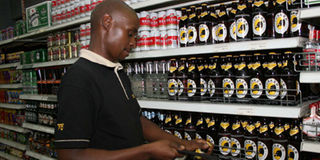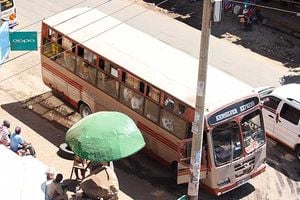Tax blues for alcohol makers

A shopper buys alcohol at a local supermarket. Manufacturers say levies are still high despite a recent reduction in excise duty. Photo/FREDRICK ONYANGO
The odds are still stacked against Kenyan distillers and brewers in the East African market despite the recent downward revision of the excise duty paid on wines and spirits by the government.
The revision, which came after spirited lobbying by the alcohol industry, addressed tax increases on low-end spirits effected in December 2008 and taxation changes announced by Finance minister Uhuru Kenyatta in his June 2009 Budget speech.
In the speech, Mr Kenyatta changed the excise duty on spirits from Sh7 per 1 per cent of alcohol per litre to Sh120 or 65 per cent ad valorem (tax based on value), whichever is higher, and that of wines from Sh7 per 1 per cent of alcohol per litre to Sh70 or 50 per cent whichever is higher.
“The two changes of December 2008 and June 2009 impacted negatively on profitability and even on the survival of some firms,” the National Alcohol Beverages Association of Kenya (NABAK) vice chair, Ken Kariuki, told the Sunday Nation. Although the 2008 increase in duty targeted the lower end market spirits, all brands were basically affected, with the likes of Keroche Breweries taking a big hit, a fact that saw the Naivasha-based firm venture into beer brewing.
Mr Kenyatta’s Budget measures, which changed the duty rates to a hybrid regime, were aimed at making portable spirits and wines affordable to consumers therefore eating into the consumption of unhygienic and illicit brews. But NABAK opposed the measures arguing that they would lead to an increase in duty of locally produced wines and spirits by up to 400 per cent.
In a strange twist of events, Keroche and its managing director, Tabitha Karanja, supported the measures by cutting prices of its products while NABAK begun the lobbying, which resulted in the recent duty reduction. However, despite the latest duty cuts, which saw some of the country’s distillers like East African Breweries Ltd (EABL) and Kenya Wine Agencies Ltd (KWAL) revise their prices, on average the country’s tax rates remain higher compared to the neighbouring countries.
This means, while lower-end spirits still pay much less duty in Tanzania, Uganda and Rwanda than in Kenya, still mainstream spirits pay less duty in Tanzania than in Kenya. In this regard, for instance, while EABL’s Kane Extra Golden 205ml attracts a duty of Sh24.60 in Kenya under the current tax regime, its equivalent in Uganda and Rwanda is taxed at Sh22.75 and Sh19 in Tanzania.
Its Richot brandy 750ml is taxed at Sh153.80; an equivalent attracts a higher tax in Uganda and Rwanda at 307.50 but far less in Tanzania, at Sh69.75. It is a situation that creates fertile ground for one of the biggest problems facing the country’s alcohol industry -- illicit spirits and cheap imports.
“Having these spirits paying more duty in Kenya than in neighbouring countries will mean that chances of smuggling from those countries are very high,” Mr Kariuki is also EABL director of Corporate Affairs. What is more, it is also emerging that the government’s reduction of duty on wines and spirits from Sh120 or 65 per cent to Sh120 or 35 per cent of the value announced in December 2009, does not include wines and spirits targeting the low-end market.
This means, while spirits sold by a manufacturer for over Sh342.85 will be subjected to the new tax regime, duties on the lower-end of the market are capped at Sh120. “It (duty reduction) favours the expensive spirits and wines most of which are imported into the country. It favours the big players but it is unfair to small local distillers and brewers,” said Ms Karanja.
It is a situation that the industry says is even more worrying in the case of beer in terms of duty differences across the region. In some cases, while Uganda and Rwanda’s rates are significantly lower than Kenya’s, Tanzania’s duty rates are said to be much lower than the country’s lowest duties.
For instance, while EABL’s Tusker Lager brand attracts Sh27 per 500ml bottle or 83 per cent of the selling price, its equivalent pays Sh19.50 per bottle or 70 per cent of the selling price in Uganda and Rwanda and TSh177 (about Sh10) per bottle or 15 per cent of selling price.
On the other hand, Allsops, which is a non-malt brand made from local raw materials, is taxed in Kenya at Sh22.50 per 500ml bottle or equivalent to 102 per cent of the selling price. Its equivalent attracts a duty of 70 per cent of selling price, which translates to Sh15.50 per bottle in Uganda and Rwanda while in Tanzania it attracts TSh104.50 (about Sh5.80) per bottle or equivalent to 26 per cent of selling price.
But Joseph Karuga of Kapari Ltd who imports Konyagi from Tanzania, feels the issue is being blown out of proportion since importers pay the necessary taxes for their imports. “If anything, the recent duty cuts favoured the local distillers because we had to reduce our prices for stocks we had paid duty for before the reduction,” Mr Karuga said.
To demonstrate it, he said they slashed their price for the Sh500ml bottle from Sh500 to Sh330. However, the local alcohol industry, while welcoming the government’s latest move, is calling for far-reaching changes. “The key solution is harmonisation of excise duty rates as well as VAT (Value Added Tax) rates across the East African Community (EAC) in the same way that customs duties have been harmonised,” said Mr Kariuki.
Such a harmonisation will also extend to the forms of taxation used across the region. For instance, while Uganda and Rwanda use the ad valorem rates, which is taxation based on value (i.e. based on percentage of selling price), Tanzania uses specific rates (based on volumes) and Kenya uses hybrid for spirits and specific for beers.




